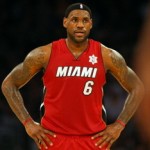The Sports Defeat Blame Game
 When teams lose, they often like to claim the winners just wanted it more. Can't anyone just admit they were overmatched?
When teams lose, they often like to claim the winners just wanted it more. Can't anyone just admit they were overmatched?
Plug into Google the phrase “they wanted it more” and you’ll get in excess of 700, 000 hits. “They outworked us” bags 55, 000, and its passive variation, “we were outworked,” another 16,000. These formulations come mostly from the sports world, and reflect a bizarre phenomenon: the tendency of athletes and coaches to attribute defeat to lack of effort and desire rather than the opponent’s superior ability and execution.
This could be seen as a sign of maturity. After all, kids often blame defeat on bad luck or officiating. To say you were outworked at least gives credit to your opponent. But this widespread tendency to attribute defeat to attitude rather than ability rests on a delusion. In sports, more often than not the better player or team wins – the one that shoots better or runs faster or serves harder. Sure, one can enhance one’s performance of such tasks through greater focus or perseverance, but only so much. Michael Jordan had a surpassing will to win, but also supreme physical gifts. The former cannot substitute for the latter.
To be sure, seeing effort as decisive serves an important function. Effort, after all, is something you can control. The coach who tells his team they lost because the other team is better may find himself without motivational buttons to push. But the notion of will-power as destiny exacts a cost, turning every contest into a referendum on one’s character. To be beaten exposes your inferiority not as an athlete, but as a person.
The Cleveland Cavaliers were recent victims of the character-as-destiny pathology. When LeBron James and the Miami Heat visited Cleveland in November, the poor Cavs were tasked with defending a city’s honor. Cleveland felt jilted when James departed the Cavs for the Heat, and craved his comeuppance. Alas, James laughed last: his Heat pummeling the Cavs by 28 points. This was not really surprising. After all, James left Cleveland in part because his teammates weren’t very good. (I am not defending his decision. See here.)
But it wasn’t enough for the Cavs to be thrashed by James and the Heat. They were pilloried by the media and their own fans who attributed their shellacking to, you guessed it, deficient character. The Cleveland Plain Dealer ran a poll, asking readers what bothered them most about the loss. They were given six choices, most involving either the team’s poor play or poor attitude. It was no contest: attitude was the culprit. 45% of respondents chose as their principal concern “the Cavs’ lack of intensity. It seemed the game meant more to the fans than to the players.” Another 43% opted for “the love-in between LeBron and his former teammates.” How about the Cavs’ inability to score? That bothered just 6% of respondents. The team’s high rate of turnovers annoyed just 1% and their failure to rebound upset even fewer!
These fans have inhaled the oxygen of our sports culture. To them, the Cavs’ problems in scoring and rebounding must be mere symptoms of the larger phenomenon: lack of desire. Just look at the smiles and hugs the Cavs players gave James. If they were snarling instead, they’d have played better. That became the prevailing narrative of the game: rather than greet James with hostility and play with passion, the Cavs reacted passively and thus got steamrolled.
It’s funny how the smiles and hugs didn’t adversely James. (He scored 38 points.) Could it be that LeBron James and the Heat didn’t outwork the Cavs, or out-desire them, but simply outplayed them because they’re superior? Defeat is unpleasant enough. Must we add insult to injury?